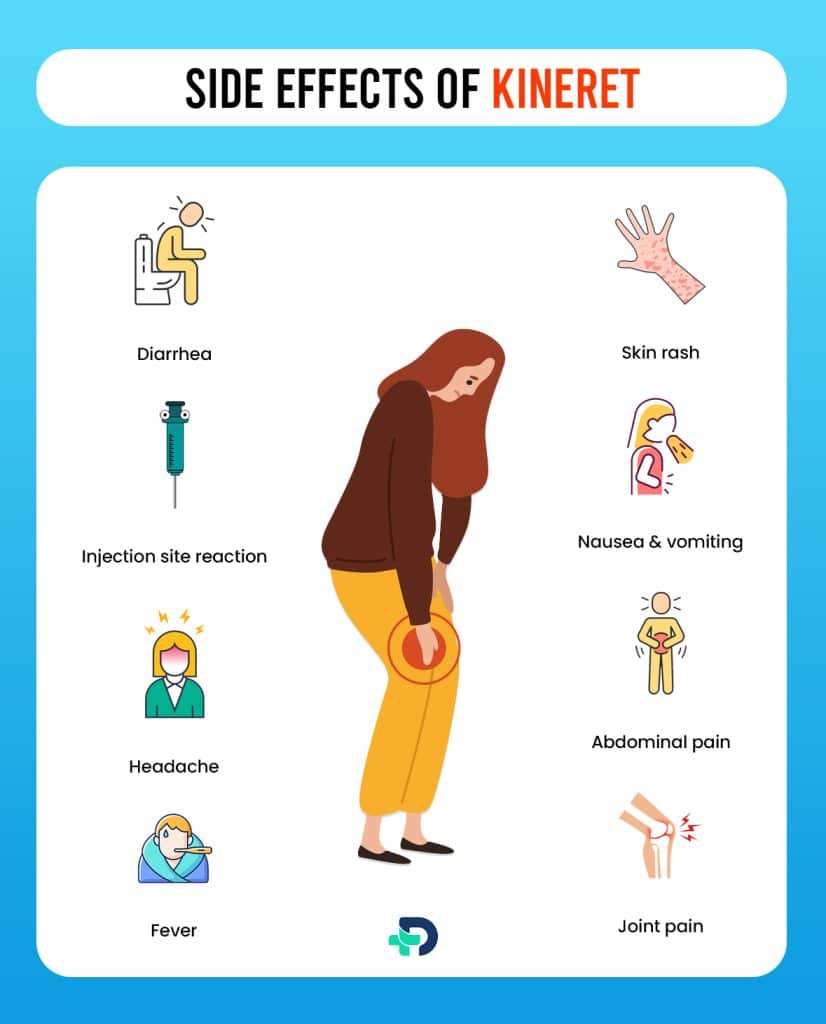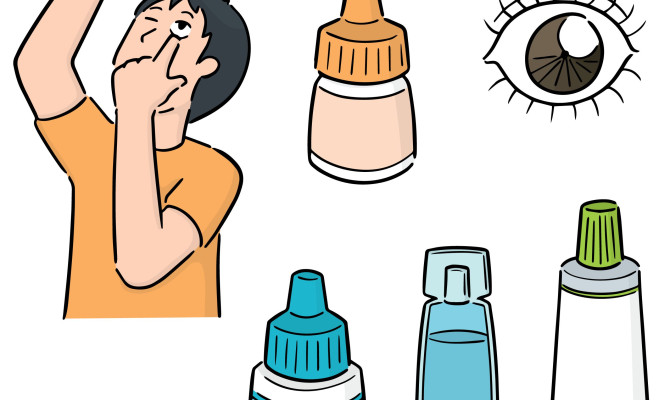Kineret: Uses, Dosage, Side effects and Interactions

- Kineret
- 22 Aug 2023
Overview
What is Kineret?
Kineret is the trade name of the prescription medication to treat rheumatoid arthritis in adults and certain genetic disorders in children and adults viz; NOMID (neonatal-onset multisystem inflammatory disease) and DIRA (deficiency of interleukin-1 receptor antagonist).
NOMID is a condition that causes chronic pain, swelling, and tissue destruction that impacts the skin, joints, and nervous system.
DIRA is a rare hereditary disease that affects the skin and bones.
Kineret comes in a liquid solution, and physicians give Kineret as an injection beneath the skin.
Health professionals might also use Kineret for other purposes not mentioned above 1Overview| Researched based study from Sciencedirect.com

Facts of Kineret
- In 2001, the FDA (The Food and Drug Administration, United States) approved the Kineret drug.
- Kineret is a biological medication synthesized from living cells.
- Kineret is not available in its biosimilar form. Biosimilar medication contains the same ingredient as the trade name biologic drug.
- Doctors administered Kineret injections to treat emergency COVID-19 ( coronavirus disease-19) patients with pneumonia, oxygen support, and increased risk of respiratory failure 2Overview| Researched based study from Nlm.nih.gov ,3Overview| Researched based study from Nlm.nih.gov
Mode of action of Kineret
- Kineret works by slowing down the body’s immune response and reduces pain and inflammation.
- Inflammation occurs in the body to fight against any infection. The body then produces IL-1Ra protein naturally to block the interleukin protein (IL-1) that causes pain and swelling.
- But in inflammatory diseases, the immune system over-reacts and attacks the body’s healthy cells causing excessive pain and swelling. So, Kineret takes up the same function as our natural IL-1Ra protein and blocks interleukin protein that causes pain and swelling 4Overview| Researched based study from Sciencedirect.com
Dosage
Dosage of Kineret
The dose of Kineret depends on several factors, such as age, body mass, other medical conditions, including kidney disease, and the condition for which taken. Initially, the physician will begin with a minor dose, and then over time, he will steadily adjust the amount suitable for the patient.
However, one must follow the amount as prescribed by the doctor.
Dosage for active (symptomatic) rheumatic arthritis
- Dose-100mg injection daily
Dosage for DIRA (deficiency of interleukin-1 receptor antagonist)
- Initial dose- 1 to 2 mg (milligram)/kg(kilogram) of body weight daily
- Maximum dose-8 mg/kg daily
Depending on the patient’s need, the doctor might give one injection or split the dose and give two injections daily.
Dosage for NOMID (neonatal-onset multisystem inflammatory disease)
- Initial dose- 1 to 2 mg/kg of body weight daily
- Maximum amount- 8 mg/kg daily
Depending on the patient’s need, the doctor might give one injection or split the dose and give two injections daily.
In children
- The dosage of Kineret for treatment in children is the same as that of adults 5Dosage| Researched based study from Nlm.nih.gov
However, always follow the dose as the doctor recommends.
Formulation of Kineret
- Kineret comes as a fluid solution in one-use prefilled syringes.
- It is available in one power (strength)-100 mg (milligram) in 0.67 mL (milliliter) of solution 8Dosage| Researched based study from Nlm.nih.gov
Taking Kineret
- Doctors administer Kineret as a subcutaneous injection under the skin. The healthcare professional will show you in dispensing the infusion. However, follow the doctor’s directions while administering Kineret at home.
- One can also watch the injection administration video from the manufacturer’s website or refer to injection instructions on the patient’s information sheet.
Some tips to follow while injecting Kineret
- One can inject Kineret on the following sites viz; upper arm, upper areas of buttock, front of mid-thigh, and abdomen.
- Avoid injecting Kineret in the same spots for the next dose to avoid injection site reaction.
- Avoid injecting Kineret in swollen, tender areas.
- The syringe is for single use, so discard any leftover medication even if it remains after injecting your recommended dose.
Missed dose
- Call the doctor for advice on when to take the next dose in case of missed doses.
- For help remembering the missed dose, try the reminder app on the phone or set an alarm for the required time.
Uses
Uses of Kineret
The FDA has approved Kineret to treat the following conditions:
- Adult Rheumatic arthritis
- NOMID (neonatal-onset multisystem inflammatory disease)
- DIRA (deficiency of interleukin-1 receptor antagonist)
Rheumatic arthritis
- It is a persistent autoimmune disorder that causes pain and swelling in affected body parts, viz; joints, and also impacts other body organs such as lungs and heart.
- Doctors recommend Kineret medications only when other drugs for RA, viz, disease-modifying antirheumatic drugs, have failed. Kineret can manage and slow the advancement of rheumatic arthritis.
Neonatal-onset multisystem inflammatory disease (NOMID)
It is a rare inflammatory disorder, usually in infants below six months. The condition causes the following symptoms:
- Persistent meningitis (swelling of the brain’s membranes)
- Joint swellings
- Fever
- Headache
- Seizures (convulsions)
DIRA (deficiency of interleukin-1 receptor antagonist)
- It is an unusual fatal hereditary condition that starts at birth. The body protein viz, interleukin-1 receptor antagonist with the disease, cannot function accurately.
- Consequently, pain and swelling occur in the body and cause damage to organs, skin, and bones 6Uses| Researched based study from Nlm.nih.gov
Side effects

Side effects of Kineret
Common side effect
- Injection site reaction with symptoms like Lump( in the injection site),Itching, Swelling, Warmth, Redness, Bleeding, Pain.
Mild side effects
- Injection site reaction
- Headache
- Fever
- Nausea and vomiting
- Abdominal pain
- Joint pain
- Diarrhea
- Sinus infection
- Skin rash
- Flu-like symptoms such as runny nose, body ache, throat pain
- Stomach flu(viral infection that causes watery diarrhea)
Serious side effects
- Worsening of rheumatic arthritis symptoms such as extreme pain in multiple joints, fever, fatigue
- Serious infection viz; pneumonia, tuberculosis
- Severe injection site reaction
- Low white blood cell count
- Hives
- Itching
- Swelling in the lips, mouth, tongue and throat
- Swelling of eyelids, feet, and hands
- Trouble breathing 7Side effects| Researched based study from Nlm.nih.gov
Overdose toxicity of Kineret
- One must not inject more Kineret than the doctor directs, as high doses can lead to serious complications.
- However, in case of accidental extreme drug intake, one must dial the crisis medical number based on the geographical site or hurry to the nearby emergency medical room9Side effects| Researched based study from Nlm.nih.gov
Precautions
Precautions
Kineret might not be appropriate for people with the following health conditions:
- Pregnant, nursing women and those planning a pregnancy should avoid using Kineret due to the lack of information on the safety and efficiency of these groups. However, those who become pregnant during Kineret treatment must consult with the healthcare professional regarding the risk and benefits of the therapy before continuing further 10Precautions| Researched based study from Nlm.nih.gov
- Allergic to Kineret or any of the components of the drug
- People with Kidney disease
- People with weakened immune system 11Precautions| Researched based study from Nlm.nih.gov
Interactions
Interactions of Kineret
Kineret can interact with different medications.
Some of the drugs that Kineret can interact with are as follows:
Tumor necrosis factor blockers
- Tumor necrosis factor blockers are drugs that weaken the immune system
- Hence, taking Klineret and Tumor necrosis factor blockers together might increase the infection risk.
Some examples of Tumor necrosis factor blockers are as follows:
- Enbrel
- Remicade
- Humira
- Simponi
Live vaccines
- Kineret weakens the body’s immune response and can increase the infection risk.
- Live vaccines contain germs in the weakened form to get protection from the infection. So if one takes Kineret and the live vaccine together, he might get the illness instead of protection from the disease for which one has taken.
Some examples of live vaccines are as follows:
- Mumps
- Chickenpox
- Rotavirus
- Measles
- Smallpox
- Typhoid 12Interactions| Researched based study from Nlm.nih.gov
However, interactions might happen with additional drugs not scheduled above. So, patients with health problems must always tell the doctor before taking the medicine.
Storage
Storage & Disposal of Kineret
Storage suggestions
- Store Kineret syringes in a freeze at 2 to 8 degrees centigrade.
- Store Kineret in the original package away from direct sunlight
- Keep Kineret out of reach of youngsters and kids.
Disposal
- Dispose of unused Kineret syringes or autoinjectors in a discarding container, viz; sharps container, to prevent unintentional overdose or casualty of animals or pets.
- Discard Kineret syringes that are out of the fridge for more than 12 hours
- Discard the medication whose expiration date has crossed.
Takeaway
Key Takeaways
- Kineret is an FDA-approved prescription for managing adult rheumatic arthritis, NOMID (neonatal-onset multisystem inflammatory disease), and DIRA (deficiency of interleukin-1 receptor antagonist)
- People with a medical problem must notify the doctor before taking Kineret to evade unnecessary complications.
- Kineret has potential side effects. So, one must take the precise doses as agreed by the doctor.
Any feedback on this article?
 This Articles content was accurate
This Articles content was accurate Very Informative Article
Very Informative Article I have a question or a comment
I have a question or a comment
 This article contains inaccurate content
This article contains inaccurate content This article was not helpful
This article was not helpful I have a question or a comment
I have a question or a comment
We appreciate your helpful feedback!
Checkout our social pages
References
-
Science Direct
Anakinra - an overview | Overview
-
National Library of Medicine
Current evidence on the use of anakinra in COVID-19 | Overview
-
National Library of Medicine
Kineret: efficacy and safety in daily clinical practice: an interim analysis of the Kineret response assessment initiative (kreative) protocol | Overview
-
Science Direct
Anakinra: Review of recombinant human interleukin-I receptor antagonist in the treatment of rheumatoid arthritis | Overview
-
National Library of Medicine
Anakinra | Dosage
-
National Library of Medicine
The use of anakinra, an interleukin-1 receptor antagonist, in the treatment of rheumatoid arthritis | Uses
-
National Library of Medicine
Injection-site reactions upon Kineret (anakinra) administration: experiences and explanations | Side effects
-
National Library of Medicine
Safety of extended treatment with anakinra in patients with rheumatoid arthritis | Dosage
-
National Library of Medicine
Long-term safety profile of anakinra in patients with severe cryopyrin-associated periodic syndromes | Side effects
-
National Library of Medicine
International multi-centre study of pregnancy outcomes with interleukin-1 inhibitors | Precautions
-
National Library of Medicine
Pharmacokinetics of anakinra in subjects with different levels of renal function | Precautions
-
National Library of Medicine
Interleukin-1 Inhibitors and Vaccination Including COVID-19 in Inflammatory Rheumatic Diseases: A Nonsystematic Review | Interactions





































